Growing up in rural Ireland my Irish identity was always questioned
Sophia shares her experience growing up with mixed heritage in rural Ireland, exploring identity, belonging, and the pressure to explain herself.

Growing up shy, with a mixed ethnic background in rural Ireland, I quickly learned that feeling Irish doesn’t always mean being seen as Irish, especially when you look different from what others expect.
Learning early that being ‘different’ draws questions
My mother is a Japanese woman who moved to Ireland over 20 years ago, and my father grew up in Ireland. But Japanese culture didn’t really feature in my day-to-day life. I didn’t speak Japanese, I didn’t know my relatives, and I had never visited Japan. So to me, it felt like I grew up in a household as Irish as anyone else’s.
How cultural expectations shaped my sense of self
One evening, while having dinner at a friend’s house, I was reminded of how my family was seen as different. While at the dinner table, her father asked if I knew any words in Japanese. I responded no, I knew none. After I said that, her father seemed surprised. He questioned how that could be true. “Not even ‘arigatou’, not even ‘konnichiwa’?”
Even though I was never taught Japanese, people suddenly expected me to speak it. It made me feel like I was failing at something I didn’t even realise I was supposed to know.
To some white people, I couldn’t pass as Irish, but I could be seen as vaguely East Asian, just not specifically Japanese. Typically, people just assumed I was Chinese. The questions about whether I was ‘really’ Irish or Japanese continued into secondary school.
Secondary school and being asked, “Where are you really from?”
Towards the end of the sixth year, I was studying for the Leaving Cert at school, and I was talking with someone from my year. While we were in discussion, he mentioned that during the graduation ceremony, he noticed a difference, in particular, between my parents. He asked, not very discreetly, why my parents had different skin tones.
This was one of the more frustrating ways I had been asked about my ethnicity. Even asking “what ethnicity are you?” is often misunderstood. When someone asks me where I am from, the question itself doesn’t make sense. Saying “I’m Irish” was never enough. People always wanted more. To me, the question “Where are you from?” feels pointless, because what they really mean is “What background are you from?”
Not fitting the beauty standards of rural Ireland
There was also the element of the physical differences I did perceive. For example, the whole trend of tanning in secondary school in preparation for social events such as discos. I worried that I wouldn’t suit a fake tan, as I didn’t look like the girls from my class. I didn’t know many people who looked like me, and none of them wore fake tan. I couldn’t picture someone like me attending a disco.
College life and finding people who understood
My thinking around what were ‘good’ traits began to shift when I started college. Starting college, I was already anxious. Even just walking down the street made me nervous. So something like wearing an outfit I liked terrified me; I aimed to be invisible, which was harder because I felt that I stood out.
But I noticed many of my college classmates had diverse backgrounds too, and that helped me feel a sense of belonging. The questions which used to annoy me became the beginning of interesting discussions of culture, and the clothes that I was once scared to wear out of fear of standing out had become my everyday wear.
Realising it’s okay to stand out
I realised that it was okay to stand out. That the world is bigger than it sometimes feels. You might feel like the only one, but in reality, there are countless others quietly navigating the same in-between spaces, and in finding each other, we begin to feel whole.
Feeling overwhelmed and want to talk to someone?
- Get anonymous support 24/7 with our text message support service
- Connect with a trained volunteer who will listen to you, and help you to move forward feeling better
- Whatsapp us now or free-text SPUNOUT to 50808 to begin.
- Find out more about our text message support service
If you are a customer of the 48 or An Post network or cannot get through using the ‘50808’ short code please text HELLO to 086 1800 280 (standard message rates may apply). Some smaller networks do not support short codes like ‘50808’.






